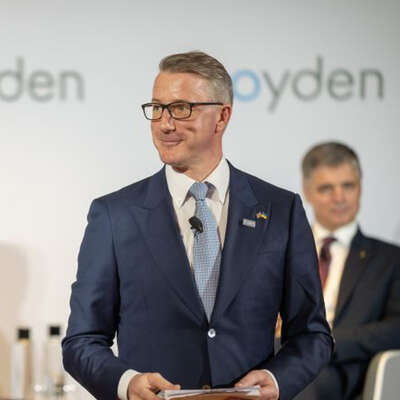Boyden’s UK Assembly, IET London 2nd November 2022, hosted a special, live appearance from Vadym Prystaiko Ukraine Ambassador to the UK and Igor Smelyansky, CEO of Ukraine postal service Ukrposhta to discuss: Leadership Through a Thunderstorm
Event summary and Q&A highlights
Hosted by Boyden United Kingdom & Ireland Managing Partner, Nick Robeson and the Boyden UK team, over 200 clients, global colleagues and other friends met at Boyden’s UK Annual Assembly 2022: a rare chance to hear, live, Vadym Prystaiko, Ukraine’s Ambassador to the UK and Igor Smelyansky, CEO of Ukraine’s postal service Ukrposhta talk about leadership during an invasion.
This is possibly the only live address sharing Ukrainian diplomatic and business perspectives with UK business leaders.
The discussion was moderated by Dominic Nicholls, Army veteran and Associate Editor-Defence, Telegraph Media Group.
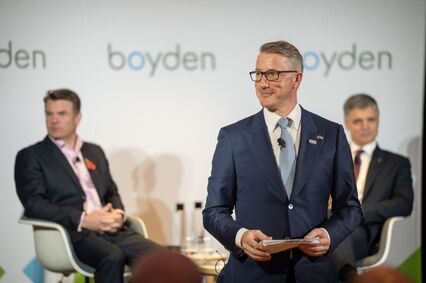
From left: Dominic Nicholls, Telegraph; Nick Robeson, Boyden; Ambassador Vadym Prystaiko
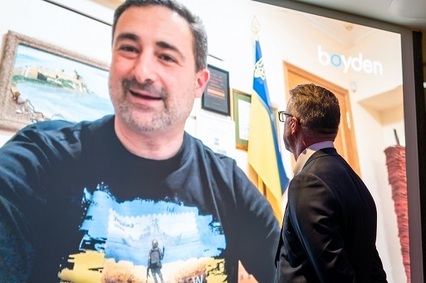
CEO Igor Smelyansky on live stream from Kyiv, with Nick Robeson
A watershed in global history
Just hours before the event, the Russian Ministry of Foreign Affairs warned the risk of nuclear confrontation between the ‘five nuclear powers’ (their words) is now the highest it has ever been.
Ukraine’s military continues to fight for everyone in Europe and worldwide. We are at a time in history when the potential for breaking the nuclear taboo that has held since 1945 has never been stronger. Vadym Prystaiko spoke for the world, saying:
“When we hear these threats, we remind everybody worldwide that they have a moral obligation not just to fight on the side of those who have been threatened, killed and bombarded every day, but because - if you do believe that our globe has to get rid of nuclear weapons - one day, sooner or later, anyone can launch this missile.”
Vadym Prystaiko and Igor Smelyansky shared extraordinary insights into their approaches to leadership during the current crisis.
Ambassador Vadym Prystaiko, diplomatic leadership themes:
Vadym has become a global leader, with the Ukraine crisis bringing the world’s attention to the potential impact of nuclear weapons. He stressed the importance of global alliances and being able to tell the Ukrainian people: ‘Fight because your friends are with you’.
Advance communications were a critical element: when Vadym sensed the Russians mobilising, he conducted 200 media interviews before 24th February, galvanising worldwide support for his country. On leadership he says:
- “To win this war, we must have two things: hope and unity. We can succeed if leaders around the world across business, government, military and beyond unite and believe Russia can be defeated.”
- “Conscience [in the form of support from other countries] is not a given and we have to work every day on that… I am driven to urge world leaders they have a moral obligation to ally with those who are killed and bombarded.”
- “I have had to understand where my team’s limits are. You can work twenty-four/seven for eight months and sooner or later they will lose their effectiveness as a team.”
- Leadership involves speaking to all audiences and offering solutions that resonate with them. “Tanks and ammunition are not expected from neutral nations; their role can be to help restore infrastructure in future.”
- Bi-party parliamentary processes are critical, together with a free press, to let steam out of the system. Otherwise, everything will break down again and again.
CEO Igor Smelyansky, business leadership themes:
Igor’s guiding principle is to do whatever it takes to be with your team to know how they feel, so you can make decisions based on what you know what they are facing.
- “You just have to keep making decisions, and your work will support you. I work with a long-term view but know that every day could be my last. No matter what my stress level is during the invasion I have to make a decision, live with it and move on to make the next one.”
- Risk adjustment changes daily, impacting leadership and decision-making. “I had to strike a balance between making key decisions on my own, and delegating decisions to the head of the regions, because the war was changing all the time.”
- In this crisis, leadership involves more individual decisions than collective decisions that would previously have involved risk officers, lawyers, checks & balances, and so on.
- In a crisis you have to break all the rules in corporate governance – risk, health & safety, insurance, what ifs… that’s how we deliver millions of products, parcels and pensions using rail freight for the first time in 21 years.
- “Formality kills business. I have always preferred an informal leadership style. Informality helps companies to move fast, like Google and Tesla in the early days”.
- “You have to be adaptable and establish informal relations with employees because it enables me to make a decision on how to move forward.”
- “Don’t be afraid to make tough decisions. You have to make a decision, live with it and move forward to the next decision.”
- “Be ambitious in decision-making, and choose what is right both morally and for the business.”
Impact on Boyden Ukraine
Nick Robeson, Chief Executive of Boyden United Kingdom & Ireland, explains:
“Russia’s invasion of Ukraine impacted Boyden very directly. Our team is based in Kyiv and on 24th Feb found itself dealing with the terrifying circumstances of the Russian invasion.
Boyden’s response was immediate and in line with the true values of our partner-led organisation. The UK, together with Poland and Spain, the Canadians and the French immediately reached out to see who could travel and five of our Ukrainian colleagues moved to different parts of the business. Boyden globally raised US$250,000 to support Boyden’s Ukraine business and the families of our colleagues.”
Oleksii Dolhikh, Managing Partner, Boyden Ukraine, commented: “I am proud to be a part of the Boyden family, who against the current injustices are continually supporting humanitarian efforts in my country. Whether it is welcoming Ukrainian colleagues into their homes or providing financial support to families, I hope that UK business leaders will hear about the medium to long-term impact they can have in resolving this crisis and defeating Russia.”
Interview highlights with Ambassador Vadym Prystaiko
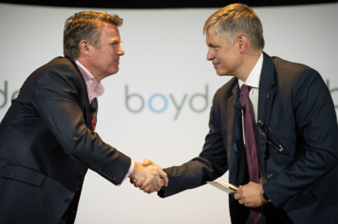
Dominic Nicholls and Vadym Prystaiko
In his first interview, Dominic Nicholls took us to the diplomatic front, to understand how to build and maintain a partnership of external countries who wish to see Ukraine prevail.
Dominic Nicholls: We are nearly nine months into Vladimir Putin’s lightning three-day offensive to take Ukraine. The war started in 2014 but it has been the most violent phase since February 24th. How do you respond to the risk of nuclear confrontation?
Vadym Prystaiko: In 1994 we were promised we would be defended if we give up nuclear weapon, and signed the Budapest Memorandum. We had weapons on the same level as the UK, France, China and more than a thousand tactical nuclear devices from Moscow. We could have been a strong, threatening nation ourselves, but we took this decision to disarm ourselves, reducing the risk to the whole of humanity. Now we are paying the price.
The Russians have their own doctrine in how they use nuclear weapons, only for ‘the defence of their nation’. But nobody is threatening them. They used to be our biggest trade partner, our biggest energy provider. I don’t see any threat to their territory or their people; I see no need for Russians to wage this or threaten anybody with nuclear devices.
“We took this decision to disarm ourselves, reducing the risk to the whole of humanity. Now we are paying the price”
Dominic Nicholls: There were many people who did not expect you to survive the first few days. After your performance, how would you prevent complacency that your victory is inevitable?
Vadym Prystaiko: We always knew the Russians would come, just not the date. When we realised this at the beginning of this year, I went to the media in the UK and did around 200 interviews in less than two months. Each time I said, ‘Russians will be faced with a fierce defensive, and we will try to do everything in our capabilities to stop them’.
When we put up a real fight, people were surprised at first, then they were encouraged, and now they have come to an understanding, imagining Russia defeated on the battlefield.
Dominic Nicholls: Is it achievable for your country to win and for Vladimir Putin to remain in power?
Vadym Prystaiko: We don’t need anything from them now. We will stop them at the border and tell them, ‘This is your problem. If you are not happy with what you achieved, with what your great leader was telling you, and now your nation is humiliated, you have lost so many people, deal with that yourself’.
I guess that Russians will survive, they only have to change their leadership. They can be wealthy with Siberia and their gas and oil; become another Canada, nice kind people, wealthy good guys.
Guest Q&A, Vadym Prystaiko
Member of Parliament: Will the war end when every Russian soldier has been pushed out of your country, or could the war will end before that and roughly on what terms?
Vadym Prystaiko: So far we are quite successful in achieving what we want to achieve and we want to sit at the table and I hope it will be on the border of Russia and Ukraine, official and formal. That’s where we can have a place and we have to negotiate something. By geography and history we have to live together.
Former army officer. Could you comment on the neutral countries and what their role is, if any, and how you are dealing with them bilaterally?
Vadym Prystaiko: They are not really neutral, for example, Norway is now fifth or sixth in military supplies to Ukraine because they changed their mind to help us.
We are talking with India, reminding them we are trying to achieve what they wanted; to live independently. We are not expecting these nations to give us tanks and ammunition. We want to tell them people will die because they will freeze to death in their homes. I expect these neutral countries to help us restore facilities to our houses, to keep hospitals operational; this is something every neutral nation can do.
Dominic Nicholls: What about your own leadership – what are you doing differently compared to nine months ago?
Vadym Prystaiko: Just two things. Leadership of myself, managing feelings of guilt, that I am in safe London and my people are dying and you pretend you are helping with this.
Secondly, in pushing my own people, I have to understand their limits. After twenty-four /seven for eight months, they will lose effectiveness as a team. Our ambitions were extremely high that, somehow, we can help the millions in Ukraine from London, believing we can resolve everything. This ambition is important, but sometimes overwhelming.
-------------------------------------------
Interview highlights with CEO Igor Smelyansky
Igor Smelyansky spoke to us via a link to Kyiv. He is a former professional soccer player, a BCG and KPMG strategy and M&A expert, a deal-maker in the energy sector and now CEO of Ukrposhta, the postal service of Ukraine. Ukrposhta is much more than a delivery service; it is also responsible for three million pensions every month, allowing Ukrainian society to continue.
In his second interview, Dominic Nicholls explored business leadership in wartime.
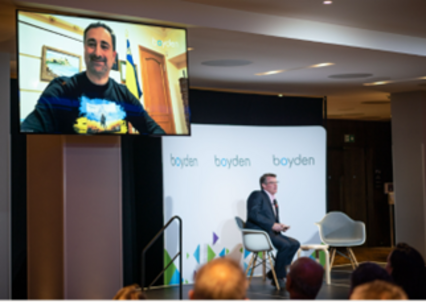
Igor Smelyansky during his live stream interview with Dominic Nicholls
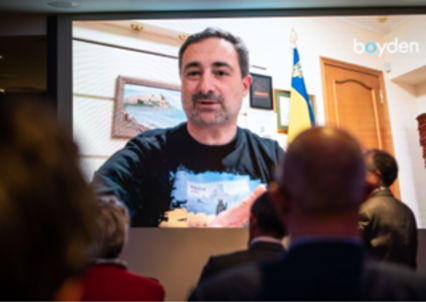
Dominic Nicholls: Where were you on Feb 24th when latest invasion broke?
Igor Smelyansky: I wasn’t at home, we finished our investment committee at 3am. I went home at 4am and at 5am got a call to hear war had started. I went back to work and made a decision to continue operations and we have worked ever since. On the first day, I paused to understand where the danger was coming from to save people’s lives, made decisions to protect state secrets, then got to work.
Dominic Nicholls: how did you establish a framework to assess risk in this new environment?
Igor Smelyansky: The risk adjustment changes every day. I had to strike a balance between making key decisions on my own and delegating to the head of the regions decisions on where they would go, because the war was changing all the time. We had to assess whether to go on the road or not, and which roads so we don’t cross Russian tanks.
We are delivering over three million pensions in cash, so we need a secure way of getting it to retirees. Bank cards don’t work when you don’t have any electricity. Bringing cash and products became more important during the first months of the war to survive.
Dominic Nicholls: What elements of the new business working arrangements would you like to retain after the war and what would you do more collectively again?
Igor Smelyansky: A lot of things we do go against standard corporate governance procedure. I often go to the front lines to support our people and understand the situation on the ground. The chief risk officer would not allow the single top executive to go to the front line, but you can’t not go, because people are waiting for you there and it’s extremely important to be with your team.
“You can’t not go [to the front line], because people are waiting for you there and its extremely important to be with your team”
Whether we can go back to the old ways, collective decision-making, attorneys, risk officers, checks and balances remains to be seen. We need a balance between making quick decisions which could be wrong, or a prolonged decision which could also be wrong because things are changing as fast as they are. Today, I was planning how the post can continue without electricity or mobile connections.
Dominic Nicholls: The last time we talked about your personal leadership style, you said ‘informality works’. When do you use that style and what are the risks?
Igor Smelyansky: Informality is natural for me and I believe formality kills the business. At companies like Google and Tesla, especially at the beginning they had informal business decision-making which is why they grew so fast. Once you start building processes between the CEO and the mail carrier, there are about 25 people, so you don’t get real information.
On the front lines, I knew exactly how people feel, and whether or not there are normal connections. For example, I go a city about 65km from Kharkiv. Before the war it would take an hour, now it takes six hours because all the bridges are gone. You have to get back before the curfew because it’s close to the military zone. So you have to be adaptable and establish informal relations with employees because it enables me to make decisions.
Guest Q&A, Igor Smelyansky
PR Consultant: You talk about the importance of government leaders backing Ukraine. Are business leaders important and how would you like them to support you?
Igor Smelyansky: It is very important for us. From the first days of the war, we ask our partners across the globe, please don’t stop sending mail or selling to Ukraine. UK companies continue to do it and Royal Mail continues to work with us. It is important because Ukraine actively sells on Amazon and ebay UK sites with over $500m sales by SMEs. It is important from a moral and business perspective that we continue to work.
“Ukraine actively sells on Amazon and ebay UK sites with over five hundred million dollars of sales by SMEs. It is important from a moral and business perspective that we work”
After the war, Russia will not disappear, they will still be at our border. The geography is what it is. Please try to work with us, and help us grow.
Guest: You have an amazing leadership style for your people to raise their game in such circumstances. What is your main strength?
Igor Smelyansky: Not being afraid to make decisions. During the war this is key and decision are really tough. The toughest early on was do I let my people work?
We made mistakes and underestimated the enemy; our truck crossed Russian tanks and they killed all the employees. It could happen any day, but there are more killed at home than at work. As sad as that statistic is, we are making the right decisions, our people are not dying at work, we are creating processes to help protect them. Ultimately you have to make a decision and live with it, and just move forward to the next decision.
Boyden’s Nick Robeson: Igor, we spoke about agility and innovation and how you and some others put a railway back together that hadn’t been used for some time.
Igor Smelyansky: We moved mail overnight, usually by truck. During the war, we couldn’t travel at night because of the curfew, and the roads are blocked. So, I met with the head of the Ukraine railway to discuss moving mail by rail, which had not been done in twenty-one years. They had twelve old postal cars stored in the warehouse.
We agreed to restart deliveries by rail, but we wanted to be ambitious. If we got lawyers involved we would never do it. So we agreed to start in five days. We restored the trucks and docking stations and updated the IT. We have now delivered up to ten million parcels by rail and have set a goal to start international post by rail, hopefully in November.
Again, I believe we should do this and keep the economy going.
Dominic Nicholls: Do you find it personally ‘intoxicating’ to be in a position where you can ignore lawyers, risk officers, corporate governance – how are you going to give that up?
Igor Smelyansky: I am a US-educated lawyer, a member of the bar association and a certified public accountant, so I know the rules. I realise that when I screw up people will come after me. You are on top while you are winning. My recipe is that you have to keep winning and your board will support you, once you start losing, they will replace you.
From my first day on the job, I told my team every day ‘we are working with a long-term perspective, every day could be our last, so let’s work the hell out of it, do the best we can and if it’s our last day, it’s our last day and we would never go back and think we could have done something different’.
To read the full transcript of the report, click here.

